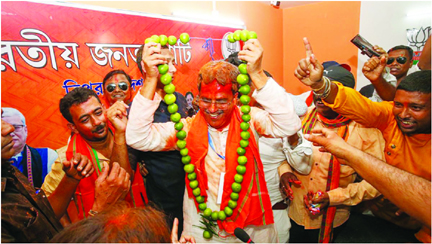New Delhi (TIP)- The Bharatiya Janata Party (BJP) and its allies retained power in Tripura and Nagaland, while in Meghalaya, the National People’s Party (NPP) emerged as the single largest party. The results show that voters in these northeastern States largely rejected calls for a change. The polls in each of the three States were seen as a litmus test for the BJP with the 2024 Lok Sabha election just a year away.
The BJP and its regional ally, the Indigenous People’s Front of Tripura, won 33 seats — 11 fewer than in 2018 but two more than the majority mark. The TIPRA Motha, which banked primarily on the ‘Tiprasa’ (tribal) people who dominate 20 of the 60 Assembly seats, lived up to the expectations by winning 13 of the 42 seats it contested.
The outcome was a setback for the Left Front, which saw its seat count dip to 11 from 16 five years ago. But the Congress gained from a seat-sharing agreement with the Left Front, winning three of the 13 seats it contested. The grand old party drew a blank in 2018. Tripura Chief Minister Manik Saha attributed the party’s victory to Prime Minister Narendra Modi, Home Minister Amit Shah and BJP national president J.P. Nadda’s leadership besides the legwork of its grassroots workers.
“We shall continue with the good work initiated in 2018 and take Tripura forward,” he said.
State BJP leaders said the victory underlined Mr. Saha’s role as the saviour of the party’s image after his predecessor Biplab Kumar Deb, who often courted controversies. Mr. Saha, a soft-spoken dental surgeon, replaced Mr. Deb as the Chief Minister nine months ahead of the elections.
Pradyot Bikram Manikya Debbarma, the chairman of Tipra Motha, said his party did well to emerge as the second largest within two years of its birth. “One has to acknowledge the discontent among the tribal people in Tripura,” he said. One of the factors that helped the BJP win is believed to be the consolidation of the non-tribal voters wary of the Greater Tipraland demand of the Tipra Motha. Non-tribals dominate 40 seats in the State.
The BJP and its dominant regional ally, the Nationalist Democratic Progressive Party (NDPP), had it fairly easy in Nagaland, a State virtually without any Opposition for a long time.
While the BJP maintained its 2018 seat count with 12 seats in the 60-member Assembly, the NDPP increased its tally to 25 from 17 in five years. Six other parties and Independents bagged the remaining 23 seats.
The other parties include the Republican Party of India (Athawale) and the Lok Janshakti Party (Ram Vilas), which won two seats each. These parties are associated with the BJP at the national level.
The Congress, once a formidable force, failed to open its account for the second successive time, while the Naga People’s Front managed only two seats, 24 fewer than in 2018.
Mandate 2023 in Nagaland proved to be historic with two women — NDPP’s Hekani Jakhalu and Salhoutuonuo Kruse — becoming the first to be elected to the State Assembly.
“The people have reposed their faith in us once again. Our responsibility to address some key issues has increased,” Nagaland Chief Minister Neiphiu Rio.
Source: The Hindu
